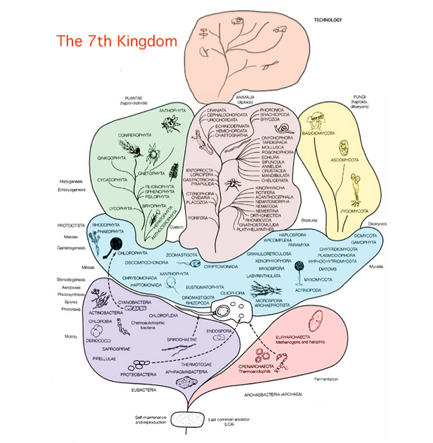 “Technology is accelerating evolution; it’s accelerating the way in which we search for ideas” – Kevin Kelly
“Technology is accelerating evolution; it’s accelerating the way in which we search for ideas” – Kevin Kelly
TED talks are one of the highest quality sources of video podcasts available on the Web; generally all are guaranteed to stimulate thought and expand your horizons. For example, my August 2006 posting on Data Visualization at Warp Speed by Hans Rosling of Gapminder, just acquired by Google, came from an earlier TED (Technology, Entertainment, Design) conference. The other thing that is cool about TED talks is that they are a perfect expression of how the Internet is democratizing the access to ideas and innovation: you now don’t have to be one of the chosen 1000 invited to TED to hear these great thoughts. Voices of one are being brought to conversations with millions.
One of the recent TED talk releases is from Wired‘s founding executive editor and technology pundit, Kevin Kelly (see especially his Technium blog). In this Feb. 2005 talk released in late 2006, Kevin argues for the notable similarities between the evolution of biology and technology, ultimately declaring technology the “7th kingdom of life.” (An addition to the standard six recognized kingdoms of life of plants, animals, etc.; see figure below.) You can see this 20-minute video yourself by clicking on Kelly’s photo above or following this link.
Longstanding readers or those who have read my Blogasbörd backgrounder in which I define the title of this blog, Adaptive Information, know of my interest in all forms of information and its role in human adaptability:
First through verbal allegory and then through written symbols and communications, humans have broken the boundaries of genetic information to confer adaptive advantage. The knowledge of how to create and sustain fire altered our days (and nights), consciousness and habitat range. Information about how to make tools enabled productivity, the creation of wealth, and fundamentally altered culture. Unlike for other organisms, the information which humans have to adapt to future conditions is not limited to the biological package and actually is increasing (and rapidly!) over time. No organism but humans has more potentially adaptive information available to future generations than what was present in the past. Passing information to the future is no longer limited to sex. Indeed, it can be argued that the fundamental driver of human economic activity is the generation, survival and sustenance of adaptive information.
Thus, information, biological or cultural, is nothing more than an awareness about circumstances in the past that might be used to succeed or adapt to the future. Adaptive information is that which best survives into the future and acts to sustain itself or overcome environmental instability.
Adaptive information, like the beneficial mutation in genetics, is that which works to sustain and perpetuate itself into the future.
Kelly takes a similar perspective, but expressed more as the artifact of human information embodied in things and processes — that is, technology. As a way of understanding the importance and role of technology, Kelly asks, “What does technology want?” By asking this question, Kelly uses the trick Richard Dawkins took in The Selfish Gene of analyzing evolutionary imperatives.
Kelly also likens technology to life. He looks at five of the defining characteristics of life — ubiquity, diversity, complexity, specialization and socialization — and finds similar parallels in technology. However, unlike life, Kelly observes that technologies don’t die, even ones that might normally be considered “obsolete.” These contrasts and themes are not dissimilar from my own perspective about the cumulative and permanent nature of human, as opposed to biological, information.
In one sense, this makes Kelly appear to be a technology optimist, or whatever the opposite of a Luddite might be called. But, I think more broadly, that Kelly’s argument is that the uniqueness of humans to overcome biological limits of information makes its expression — technology — the uniquely defining characteristic of our humanness and culture. So, rather than optimism or pessimism, Kelly’s argument is ultimately a more important one of essence.
In this regard, Kelly is able to persuasively argue that technology brings us that unique prospect of a potentially purposeful future that we capture through such words as choice, freedom, opportunity, possibility. Technology is adaptive. What makes us human is technology, and more technology perhaps even makes us more “human.” As Kelly passionately concludes:
“Somewhere today there are millions of young children being born whose technology of self-expression has not yet been invented. We have a moral obligation to invent technology so that every person on the globe has the potential to realize their true difference.”
[BTW, Today, a new 1-hr podcast interview with Kevin Kelly was released by EconTalk; it is a more current complement to the more thought-provoking video above, including relevant topics to this blog of Web 3.0 and the semantic Web. I recommend you choose the download version, rather than putting up with the spotty real-time server.]






